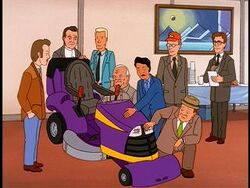Nikki Finke Hates Ben Silverman, Chapter XVIIIIII
You may have seen that Nikki Finke posted a report on audience-testing data for Parks and Recreation, the new Amy Poehler show from the producers of The Office. Even granted that a) anything Ben Silverman executive-produces for his own network is an irresistible target and b) no one can resist speculating that a new, much-hyped show is in trouble, that seems like kind of a low blow. Focus-group responses don’t tell you much about how well the show is doing, and this report doesn’t suggest that it’s in any more trouble than any other show.
Share

You may have seen that Nikki Finke posted a report on audience-testing data for Parks and Recreation, the new Amy Poehler show from the producers of The Office. Even granted that a) anything Ben Silverman executive-produces for his own network is an irresistible target and b) no one can resist speculating that a new, much-hyped show is in trouble, that seems like kind of a low blow. Focus-group responses don’t tell you much about how well the show is doing, and this report doesn’t suggest that it’s in any more trouble than any other show.
Focus-group responses are useful for various things — like pinpointing aspects of the show that might turn off the viewers, or aspects of the show that play particularly well; the instantly-famous line about the lack of “datable” men will almost certainly be used by NBC to push to make one or more of the male characters more likable. But as a flat-out test of how popular the show is going to be, focus groups are hard to figure because they’re always self-contradictory: the participants are asked questions that inherently contradict each other, but both sound like good ideas. The Simpsons famously explains how this works in “The Itchy & Scratchy & Poochie Show.”
“Okay, how many of the kids would like Itchy & Scratchy to deal with real life problems like the ones you face every day?”
“Yay!”
“And who would like to see them do just the opposite, getting into far-out situations involving robots and magic powers?”
“Yay!”
“So you want a realistic down-to-earth show that’s completely off the wall and swarming with magic robots.”
And now look at the report on Parks and Recreation, which has the exact same dynamic: the respondents want it to be more like The Office because they like that show, but they also think it’s too much like The Office.
Expectations for this show are very high, especially among OFFICE viewers. Many had seen the promos and were expecting an “OFFICE-type mockumentary” with the same tone, but felt the pilot was too close and similar to the OFFICE.
The thing is that those are both legitimate points — we do want it to give us the same things The Office does, but we don’t want it to be just the same as The Office — but that’s why the points are of limited usefulness; legitimate points often have a way of canceling each other out.
Since this is a Greg Daniels production: does anybody remember the episode of King of the Hill where Hank and his father are on a focus group for a new, modern, wimpy redesign for Hank’s beloved lawn mower? Twelve Angry Men style, Hank is the only one who opposes the redesign, and eventually talks everyone around to seeing things his way, but it becomes apparent that this is really not so much about the mower as Hank’s resentment over his father dumping his mom for a younger woman. Nobody combines comedy with pain with underlying emotional themes like Daniels, which is why I’m looking forward to this new show, despite my contradictory desire for it to be more and less like The Office.
My mower is not too old and my Mom was not too old. But this isn’t about my Mom and it certainly isn’t about my mower. It’s about a bitter old man who blames everybody but himself for his own problems. And if you ever talk like that again about my Mom or my mower, you’re not welcome in my house.